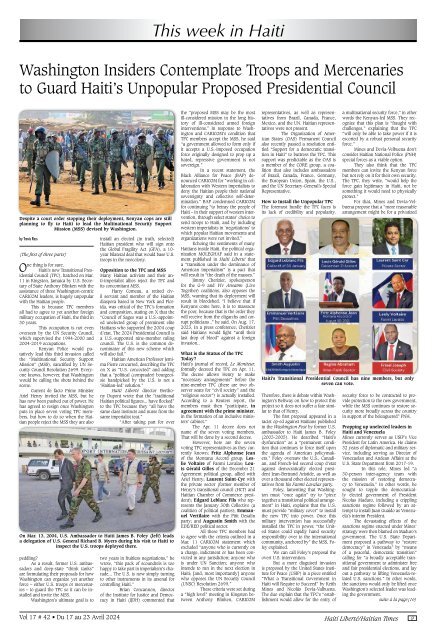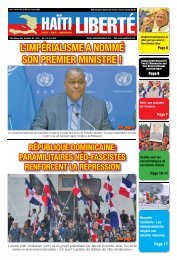Haiti Liberte 17 Avril 2024
- No tags were found...
You also want an ePaper? Increase the reach of your titles
YUMPU automatically turns print PDFs into web optimized ePapers that Google loves.
This week in <strong>Haiti</strong><br />
Washington Insiders Contemplate Troops and Mercenaries<br />
to Guard <strong>Haiti</strong>’s Unpopular Proposed Presidential Council<br />
Despite a court order stopping their deployment, Kenyan cops are still<br />
planning to fly to <strong>Haiti</strong> to lead the Multinational Security Support<br />
Mission (MSS) devised by Washington.<br />
by Travis Ross<br />
(The first of three parts)<br />
One thing is for sure.<br />
<strong>Haiti</strong>’s new Transitional Presidential<br />
Council (TPC), hatched on Mar.<br />
11 in Kingston, Jamaica by U.S. Secretary<br />
of State Anthony Blinken with the<br />
assistance of three Washington-centric<br />
CARICOM leaders, is hugely unpopular<br />
with the <strong>Haiti</strong>an people.<br />
This is because TPC members<br />
all had to agree to yet another foreign<br />
military occupation of <strong>Haiti</strong>, the third in<br />
30 years.<br />
This occupation is not even<br />
overseen by the UN Security Council,<br />
which supervised the 1994-2000 and<br />
2004-2019 occupations.<br />
Kenyan Police would putatively<br />
lead this third invasion called<br />
the “Multinational Security Support<br />
Mission” (MSS), sanctified by UN Security<br />
Council Resolution 2699. Everyone<br />
knows, however, that Washington<br />
would be calling the shots behind the<br />
scene.<br />
Current de facto Prime Minister<br />
Ariel Henry invited the MSS, but he<br />
has now been pushed out of power. He<br />
has agreed to resign once Washington<br />
puts in place seven voting TPC members,<br />
but how to do so when the <strong>Haiti</strong>an<br />
people reject the MSS they are also<br />
peddling?<br />
As a result, former U.S. ambassadors<br />
and deep-state “think tanks”<br />
are formulating their proposals for how<br />
Washington can organize yet another<br />
force – either U.S. troops or mercenaries<br />
– to guard the TPC so it can be installed<br />
and invite the MSS.<br />
Washington’s ultimate goal is to<br />
install an elected (in truth, selected)<br />
<strong>Haiti</strong>an president who will sign onto<br />
the Global Fragility Act (GFA), a 10-<br />
year bilateral deal that would base U.S.<br />
troops in the neocolony.<br />
Opposition to the TPC and MSS<br />
Many <strong>Haiti</strong>an activists and their anti-imperialist<br />
allies reject the TPC and<br />
its concomitant MSS.<br />
Harry Comeau, a retired civil<br />
servant and member of the <strong>Haiti</strong>an<br />
diaspora based in New York and Florida,<br />
was critical of the TPC’s formation<br />
and composition, stating on X that the<br />
“Council of Sages was a U.S.-appointed<br />
unelected group of prominent elite<br />
<strong>Haiti</strong>ans who supported the 2004 coup<br />
d’etat. The <strong>2024</strong> Presidential Council is<br />
a U.S.-supported nine-member ruling<br />
council. The U.S. is the common denominator<br />
of this new scheme which<br />
will also fail.”<br />
<strong>Haiti</strong>an American Professor Jemima<br />
Pierre concurred, describing the TPC<br />
on X as “U.S. concocted” and adding<br />
that a “political (comprador) bourgeoisie<br />
handpicked by the U.S. is not a<br />
‘<strong>Haiti</strong>an-led’ solution.”<br />
<strong>Haiti</strong> Liberté director Berthony<br />
Dupont wrote that the “traditional<br />
<strong>Haiti</strong>an political figures... have flocked”<br />
to the TPC because they “all have the<br />
same class instincts and nurse from the<br />
same imperialist teat.”<br />
“After taking part for over<br />
On Mar. 13, 2004, U.S. Ambassador to <strong>Haiti</strong> James B. Foley (left) leads<br />
a delegation of U.S. General Richard B. Myers during his visit to <strong>Haiti</strong> to<br />
inspect the U.S. troops deployed there.<br />
Moses Eshiwani<br />
two years in fruitless negotiations,” he<br />
wrote, “this pack of scoundrels is too<br />
happy to take part in imperialism’s charade...<br />
The U.S. is now simply turning<br />
to other instruments in its arsenal for<br />
controlling <strong>Haiti</strong>.”<br />
Brian Concannon, director<br />
of the Institute for Justice and Democracy<br />
in <strong>Haiti</strong> (IJDH) commented that<br />
the “proposed MSS may be the most<br />
ill-considered mission in the long history<br />
of ill-considered armed foreign<br />
interventions.” In response to Washington<br />
and CARICOM’s condition that<br />
TPC members accept the MSS, he said<br />
“a government allowed to form only if<br />
it accepts a U.S.-imposed occupation<br />
force originally designed to prop up a<br />
hated, repressive government is not<br />
sovereign.”<br />
In a recent statement, the<br />
Black Alliance for Peace (BAP) denounced<br />
CARICOM for “working in collaboration<br />
with Western imperialists to<br />
deny the <strong>Haiti</strong>an people their national<br />
sovereignty and collective self-determination.”<br />
BAP condemned CARICOM<br />
for continuing “to betray the people of<br />
<strong>Haiti</strong> – in their support of western intervention,<br />
through select states’ choice to<br />
send troops to <strong>Haiti</strong>, and by including<br />
western imperialists in ‘negotiations’ to<br />
which popular <strong>Haiti</strong>an movements and<br />
organizations were not invited.”<br />
Echoing the sentiments of many<br />
<strong>Haiti</strong>ans inside <strong>Haiti</strong>, the political organization<br />
MOLEGHAF said in a statement<br />
published in Haïti Liberté that<br />
a “transition under the dominance of<br />
American imperialism” is a pact that<br />
will result in “the death of the masses.”<br />
Jimmy Cherizier, spokesperson<br />
for the G-9 and Viv Ansamn (Live<br />
Together) coalitions, also opposes the<br />
MSS, warning that its deployment will<br />
result in bloodshed. “I believe that if<br />
Kenyans come here, it is to massacre<br />
the poor, because that is the order they<br />
will receive from the oligarchs and corrupt<br />
politicians ,” he said. On Aug. <strong>17</strong>,<br />
2023, In a press conference, Cherizier<br />
said <strong>Haiti</strong>ans would fight “until their<br />
last drop of blood” against a foreign<br />
invasion..<br />
What is the Status of the TPC<br />
Today?<br />
<strong>Haiti</strong>’s journal of record, Le Moniteur,<br />
formally decreed the TPC on Apr. 11.<br />
The decree allows Henry to make<br />
“necessary arrangements” before the<br />
nine-member TPC (there are two observer<br />
seats for “civil society” and the<br />
“religious sector”) is actually installed.<br />
According to a Reuters report, the<br />
members must then “participate, in<br />
agreement with the prime minister,<br />
in the formation of an inclusive ministers’<br />
cabinet.”<br />
The Apr. 11 decree does not<br />
name of the seven voting members.<br />
That will be done by a second decree.<br />
However, here are the seven<br />
voting TPC representatives as they currently<br />
known: Fritz Alphonse Jean<br />
of the Montana Accord group; Leslie<br />
Voltaire of Fanmi Lavalas; Louis<br />
Gérald Gilles of the December 21<br />
Agreement political group, allied with<br />
Ariel Henry; Laurent Saint-Cyr with<br />
the private sector (former member of<br />
Henry’s transitional council (HCT) and<br />
<strong>Haiti</strong>an Chamber of Commerce president);<br />
Edgard Leblanc Fils who represents<br />
the January 30th Collective (a<br />
coalition of political parties); Emmanuel<br />
Vertilaire with the Pitit Desalin<br />
party; and Augustin Smith with the<br />
EDE/RED political sector.<br />
All these TPC members had<br />
to agree with the criteria outlined in a<br />
Mar. 11 CARICOM statement which<br />
excluded “anyone who is currently on<br />
a charge, indictment or has been convicted<br />
in any jurisdiction; anyone who<br />
is under UN Sanction; anyone who<br />
intends to run in the next election in<br />
<strong>Haiti</strong>; [and, most importantly] anyone<br />
who opposes the UN Security Council<br />
(UNSC) Resolution 2699.”<br />
These criteria were set during<br />
a “high level” meeting in Kingston between<br />
Anthony Blinken, CARICOM<br />
representatives, as well as representatives<br />
from Brazil, Canada, France,<br />
Mexico, and the UN. <strong>Haiti</strong>an representatives<br />
were not present.<br />
The Organization of American<br />
States (OAS) Permanent Council<br />
also recently passed a resolution entitled<br />
“Support for a democratic transition<br />
in <strong>Haiti</strong>” to buttress the TPC. This<br />
support was predictable as the OAS is<br />
a member of the CORE group, a coalition<br />
that also includes ambassadors<br />
of Brazil, Canada, France, Germany,<br />
the European Union, Spain, the U.S.,<br />
and the UN Secretary-General’s Special<br />
Representative.<br />
How to Install the Unpopular TPC<br />
The foremost hurdle the TPC faces is<br />
its lack of credibility and popularity.<br />
Therefore, there is debate within Washington’s<br />
Beltway on how to protect this<br />
project so it does not suffer a fate similar<br />
to that of Henry.<br />
The first proposal appeared in a<br />
racist op-ed against <strong>Haiti</strong>ans published<br />
in the Washington Post by former U.S.<br />
ambassador to <strong>Haiti</strong> James B. Foley<br />
(2003-2005). He described “<strong>Haiti</strong>’s<br />
dysfunction” as a “permanent condition<br />
that continues to force itself upon<br />
the agenda of American policymakers.”<br />
Foley oversaw the U.S., Canadian,<br />
and French-led second coup d’etat<br />
against democratically elected president<br />
Jean-Bertrand Aristide, as well as<br />
over a thousand other elected representatives<br />
from his Fanmi Lavalas party.<br />
Foley, lamenting that Washington<br />
must “once again” try to “piece<br />
together a transitional political arrangement”<br />
in <strong>Haiti</strong>, explains that the U.S.<br />
must provide “military cover” to install<br />
the new TPC into power. Once this<br />
military intervention has successfully<br />
installed the TPC in power, “the United<br />
States could rapidly hand security<br />
responsibility over to the international<br />
community, anchored by” the MSS, Foley<br />
explained.<br />
We can call Foley’s proposal the<br />
overt U.S. intervention.<br />
But a more disguised invasion<br />
is proposed by the United States Institute<br />
for Peace (USIP) in a piece entitled<br />
“What a Transitional Government in<br />
<strong>Haiti</strong> will Require to Succeed” by Keith<br />
Mines and Nicolás Devia-Valbuena.<br />
The duo explain that the TPC’s “establishment<br />
would allow for the entry of<br />
a multinational security force,” in other<br />
words the Kenyan-led MSS. They recognize<br />
that this plan is “fraught with<br />
challenges,” explaining that the TPC<br />
“will only be able to take power if it is<br />
escorted by a robust personal security<br />
force.”<br />
Mines and Devia-Velbuena don’t<br />
consider <strong>Haiti</strong>an National Police (PNH)<br />
special forces as a viable option.<br />
They also think that the TPC<br />
members can invite the Kenyan force<br />
but not rely on it for their own security.<br />
The TPC, they write, “would help the<br />
force gain legitimacy in <strong>Haiti</strong>, not be<br />
something it would need to physically<br />
protect.”<br />
For that, Mines and Devia-Velbuena<br />
propose that a “more reasonable<br />
arrangement might be for a privatized<br />
<strong>Haiti</strong>’s Transitional Presidential Council has nine members, but only<br />
seven can vote.<br />
security force to be contracted to provide<br />
protection to the new government,<br />
while the MSS continues to restore security<br />
more broadly across the country<br />
in support of the beleaguered” PNH.<br />
Propping up unelected leaders in<br />
<strong>Haiti</strong> and Venezuela<br />
Mines currently serves as USIP’s Vice<br />
President for Latin America. He claims<br />
32 years of diplomatic and military service,<br />
including serving as Director of<br />
Venezuelan and Andean Affairs at the<br />
U.S. State Department from 20<strong>17</strong>-19.<br />
In this role, Mines led “a<br />
30-person inter-agency team with<br />
the mission of restoring democracy<br />
to Venezuela.” In other words, he<br />
sought to topple the democratically<br />
elected government of President<br />
Nicolas Maduro, including a crippling<br />
sanctions regime followed by an attempt<br />
to install Juan Guaido as Venezuela’s<br />
interim President.<br />
The devastating effects of the<br />
sanctions regime enacted under Mines’<br />
strategy were then blamed on Maduro’s<br />
government. The U.S. State Department<br />
proposed a pathway to “restore<br />
democracy” in Venezuela” by “means<br />
of a peaceful, democratic transition”<br />
calling for “a broadly acceptable transitional<br />
government to administer free<br />
and fair presidential elections, and lay<br />
out a pathway to lifting Venezuela-related<br />
U.S. sanctions.” In other words,<br />
the sanctions would only be lifted once<br />
Washington’s selected leader was leading<br />
the government.<br />
suite à la page(16)<br />
Vol <strong>17</strong> # 42 • Du <strong>17</strong> au 23 <strong>Avril</strong> <strong>2024</strong><br />
<strong>Haiti</strong> Liberté/<strong>Haiti</strong>an Times<br />
9














